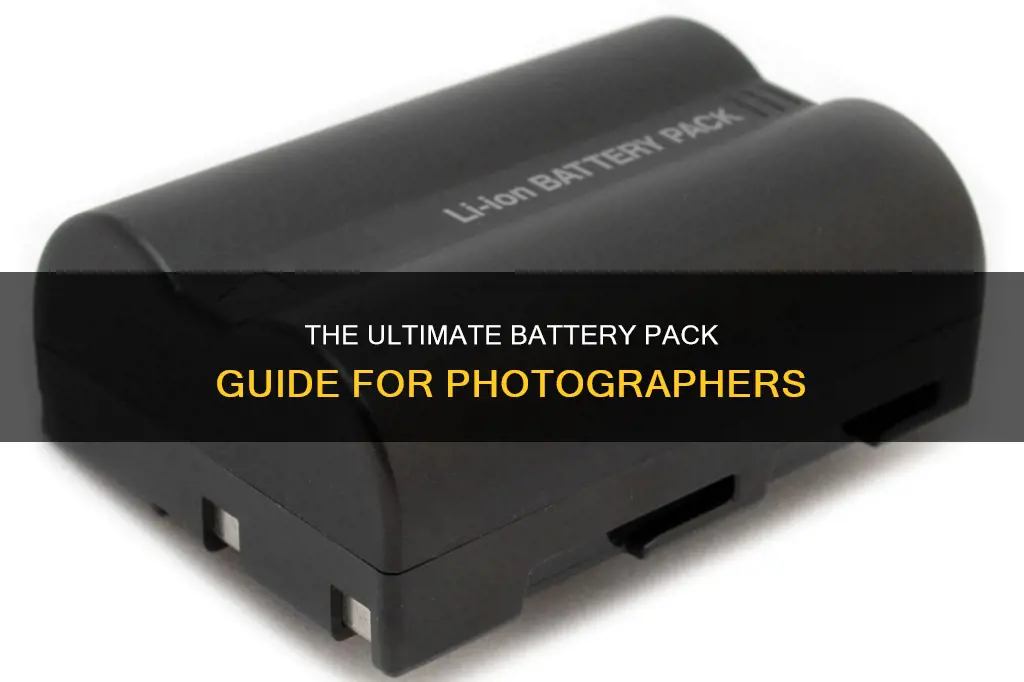
The lifespan of a camera battery pack depends on several factors, including usage, storage, and charging habits. On average, a camera battery can last for about 400 shots or 8-10 hours on a full charge, with a lifespan of at least five years if properly maintained. However, this can vary depending on the camera model, battery health, and usage patterns. Some DSLR cameras can last up to eight hours with regular use, but continuous photo-taking can reduce the battery life to around three hours. Additionally, factors such as wireless connections, stabilization features, and temperature can impact battery performance. Proper care, such as avoiding complete discharge, overnight charging, and extreme temperatures, can extend the battery's lifespan.
| Characteristics | Values |
|---|---|
| Average number of shots on a single charge | 400 |
| Average number of shots for a Canon camera on a single charge | 850 |
| Average number of shots for a Canon point-and-shoot camera on a single charge | 320 |
| Average battery life of a DSLR camera with continuous photo-taking | 3 hours |
| Average battery life of a DSLR camera with proper usage | 8 hours |
| Average number of times a battery can be recharged | 500 |
| Average lifespan of a battery with proper care | 5 years |
What You'll Learn

A camera battery lasts about 400 shots or 8-10 hours on a full charge
A camera battery's longevity depends on several factors, including the camera's settings, usage, and working environment. Typically, a fully charged camera battery will last for about 400 shots or 8-10 hours. However, this duration can vary depending on the camera's model and features. For instance, a Canon camera can capture approximately 850 shots on a single charge, while a DSLR camera can last up to eight hours with efficient use, but only three hours if taking continuous photos.
To maximise battery life, it is essential to understand the factors that influence its performance. Firstly, wireless connections, such as Wi-Fi, GPS, NFC, and Bluetooth, can significantly drain the battery. Turning off these connections when not in use can help conserve power. Additionally, disabling camera stabilisation, sensor cleaning, and image review features can extend battery life. It is also crucial to avoid complete discharge and overnight charging, as these practices can negatively impact the battery's health. Storing the battery in a temperature-controlled environment, away from direct sunlight and extreme cold, is another way to maintain its longevity.
By following these guidelines and understanding the factors affecting battery life, photographers can ensure they have sufficient power to capture the moments that matter.
It is worth noting that the lifespan of a camera battery, which refers to its long-term durability, is different from its runtime on a single charge. A camera battery, when properly cared for, should last at least five years. However, this lifespan can be influenced by various factors, including the frequency of use, charging habits, and storage conditions.
Charging the Heimvision Camera: A Step-by-Step Guide
You may want to see also

A DSLR camera can last up to eight hours if used properly
Factors Affecting Battery Life
First, it is important to note that the battery life of a DSLR camera depends on how it is being used. If you are taking photos continuously, your DSLR camera is more likely to last up to three hours. Additionally, recording videos will consume more battery power. Therefore, it is always a good idea to carry an extra battery pack, especially if you are a professional photographer covering events such as weddings.
The type of camera you have will also affect battery life. For example, a Canon camera will last for about 850 shots, while a Canon point-and-shoot camera will last up to 320 shots on a single charge.
The health of your battery and how you use your camera will also impact its life. To ensure your DSLR camera's battery lasts longer, it is recommended that you do not discharge batteries completely. Lithium-ion batteries do not need to be discharged completely before being recharged. Letting the battery drain completely can damage the cells and negatively affect the battery's lifespan. Instead, try to keep the battery level between 20% and 80%.
Another factor that can affect battery life is the temperature at which the battery is stored. Avoid exposing the batteries to direct sunlight, and keep them warm in cool weather. Storing your batteries in a temperature-friendly place will help maintain their health.
Tips to Improve Battery Life
- Turn off all wireless connections when not in use. Features like Wi-Fi, GPS, NFC, and Bluetooth can use up a lot of battery power without you realising it.
- Turn off stabilisation. While this feature is useful, it uses a lot of power. If you are running low on battery, it is best to turn this feature off temporarily.
- Turn off sensor cleaning. This feature is not essential and uses a small amount of battery power.
- Turn off image review. If you are running low on battery, avoid reviewing photos on your camera's LCD screen.
- Turn the camera off completely when not in use. While modern cameras are more efficient at saving battery power, turning off your camera in between shots can still help conserve battery life.
Charging Your Ricoh Camera: A Step-by-Step Guide
You may want to see also

A Canon camera can last for about 850 shots
There are several factors that can affect how long a camera battery lasts. One factor is the number of charge cycles. Batteries lose capacity as the number of charge cycles increases, and they can typically be recharged about 500 times before reaching the end of their useful life. Additionally, the settings, usage, and working environment of the camera can impact battery life. For example, recording videos will consume more battery power than simply taking photos.
To prolong the life of a camera battery, it is recommended to avoid completely discharging the battery and to store it in a temperature-friendly place, away from direct sunlight and extreme cold. It is also important to recharge the battery regularly and to avoid leaving it charging overnight, as this can negatively impact its health.
By understanding the factors that affect battery life and following proper care and maintenance tips, photographers can ensure that their camera batteries last as long as possible, maximizing their shooting time and minimizing the need for frequent recharging or replacement.
Lithium Batteries: Powering Your Camera, What You Need to Know
You may want to see also

A camera battery should last at least five years if properly maintained
A camera battery, if properly maintained, should last at least five years. However, this lifespan can be affected by several factors, such as usage, working environment, and storage conditions.
Lithium-ion batteries, which are commonly used in cameras, can degrade over time, even when not in use. On average, these batteries have a shelf life of around two to five years. To prolong their lifespan, it is essential to store them in a temperature-controlled environment, avoiding extreme heat or cold. Additionally, it is recommended to keep the battery charge between 20% and 80% and avoid overnight charging.
The number of charge cycles also impacts the lifespan of a camera battery. On average, rechargeable batteries can be recharged about 500 times before reaching the end of their useful life. This can vary depending on the battery's usage and settings. For example, recording videos or using additional accessories will consume more power, reducing the overall battery life.
To ensure your camera battery lasts at least five years, it is crucial to follow proper maintenance practices. This includes using the battery regularly, recharging it after each use, and avoiding complete discharge. By implementing these practices and being mindful of the factors that affect battery life, photographers can maximise the lifespan of their camera batteries.
In summary, a camera battery that is properly maintained and used appropriately should last a minimum of five years. By understanding the factors that influence battery life and following recommended care guidelines, photographers can optimise their battery's performance and longevity.
Browning Trail Cameras: Maximizing Battery Life
You may want to see also

The average camera battery can be recharged about 500 times
The lifespan of a camera battery is also influenced by how well it is maintained. To prolong the life of your camera battery, it is recommended to avoid complete discharge and not to leave it charging overnight. Additionally, storing the battery in extremely hot or cold temperatures can impact its performance and longevity.
It is worth noting that camera batteries have a finite lifespan, and even with proper care, they will eventually need to be replaced. On average, a camera battery should last for at least five years if properly maintained. However, this can vary depending on usage patterns and other factors.
To maximise the lifespan of your camera battery, it is advisable to follow the manufacturer's guidelines for care and maintenance. This includes using the recommended charger, adhering to the optimal charging routine, and storing the battery in a temperature-controlled environment.
By understanding the factors that affect battery life and implementing proper care practices, photographers can ensure their camera batteries remain reliable and functional for an extended period.
Charging Your Panasonic Lumix DMC-FZ70 Camera Battery: A Guide
You may want to see also
Frequently asked questions
A camera battery should last for about 400 shots on a single charge or about 8-10 hours on a full charge. The battery life also depends on the type of camera you are using. For example, a Canon camera lasts for about 850 shots, while a DSLR camera can last up to eight hours if used properly.
The lifespan of a camera battery is about five years if properly maintained. However, this can vary depending on usage and other factors.
To prolong your camera battery's lifespan, avoid letting it discharge completely. Additionally, avoid charging it overnight, and keep it away from hot and cold temperatures.
It is possible that an old camera battery will still work, but its performance may not be as good as when it was new. The battery's capacity may also be reduced.







